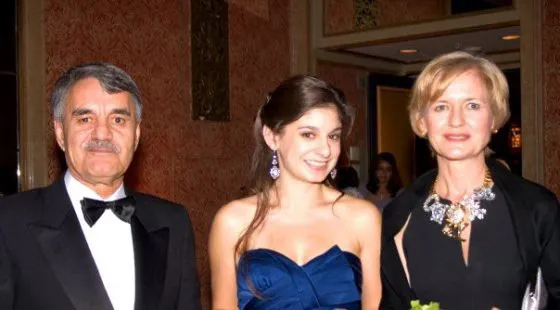
Eva Faizi with her father and mother.
Speaking in Tongues
The first word I ever spoke was Farsi: Baba, which means father. It makes for an interesting conversation starter; I grew up speaking three languages simultaneously, but I am the definition of American.
Most of my father’s family, while having immigrated to the United States to escape their war-torn homeland almost 40 years ago, do not speak more than a sentence of English. Growing up with a grandmother who also struggled in her new surroundings forced me to maintain my Farsi until I was a teenager.
I have a tumultuous relationship with this language, to say the least. My mother tells me that, as a child, I would mix German, English, and Farsi words together in one sentence of gibberish that only she could understand.
I joke with her now, saying that it’s no wonder that I’m a linguistically confused adult. That I had moments of embarrassment speaking to my French teacher in Farsi when I was over-tired.
That there is no greater frustration in the world than when someone asks me: “Quick! How do you say onion in Farsi?!” Knowing that I can remember how to say it in French, German, English, and Arabic, but not Farsi. Not at the moment. If that individual returned fifteen minutes later, I would have it, but there is no consolation prize, no show of admiration for my lack of quick wit.
When I was about eleven, my older cousins took me along to my grandmother’s dentist appointment. I acted as the lone interpreter for her denture fitting while they parked the car. I struggled, translating the same questions over and over again, the dentist unsatisfied with her answers.
“Does it hurt? Does it pinch anywhere? Does it hurt?” Sweat beading on my forehead, there was no explaining to the dentist that I didn’t know how the hell to say ‘dentures’ in Farsi, or if there even was an equivalent word. I don’t think dentures are an oft-seen commodity in countries where women aren’t even allowed to read.
Once, upon knowing that I grew up speaking the language, a co-worker of mine asked me: “How do you say, ‘My name is Eva’ in Farsi?” I was stumped and ultimately mortified that I didn’t have the answer.
Looking back, I realize it’s because no one asks you to introduce yourself, no one really needs to know your name in the Afghan culture. You’re solely identified by your most notable relatives, in my case, I am my father’s daughter. “Hello, my name is...” doesn’t really exist. I’ve never had to use those words in a sentence.
I say I’m the black sheep of the family, maybe the only American-born member of my generation. It’s perhaps this and not the language barrier that is so divisive. The fact that I’m also mixed race makes me an oddity. Even as a successful and educated 34-year-old woman, I constantly relive my desperate childhood need to fit into a society where I will always be an anomaly.
I am the only daughter of a well-respected and well-known member of the community. When I make my way through the crowd at family gatherings, saying hello, and kissing cheeks, there is often a discussion that trails behind me. Most of the words are sweet, acknowledging me. It’s only when I sit down, that I feel the sick feeling of a creature on display.
They don’t know that when they discuss me openly, across a room, that I can understand them. When they ask “Can she speak Farsi? Does she know the language?” I know their disappointment. I am like a broken toy. I’m fully aware that my speech is now limited to niceties, complimenting the food, inquiring as to one’s health, tea preferences, etc.
But, my comprehension of the language has not faded. I can only think that this is what a locked-in person must feel, my eyes darting around the room, following the conversation. Aside from the deeply stifling need to defend myself, I could never imagine shouting over the crowd of people that I understand them.
I understand every word they say about me as I sit next to them. The sad looks they give me, like I am an ugly velvet painting among a wall of Picassos, are not lost on me.
They don’t know or care that I have two degrees, that I graduated from college with honors, or that I could once write beautiful, complete papers in Arabic. They don’t know that I’m an artist, that I have students who tell me I am the best teacher, students who hug me every day when they leave.
I tell myself that it’s inherent, that I could walk into the room tomorrow, with the most exquisite of homemade Afghan dishes in my hand, singing in Farsi, reading from the Qu’ran; I still wouldn’t be good enough. I will always be a fabulous imitation of them.
So I sit there, clutching my tepid tea, feeling as if my insides are piled beneath the chair I’m sitting in. I endure the looks with a placid expression on my face, like an animal in the zoo. Telling myself over and over:
I love my family...I love my family...I love my family...



